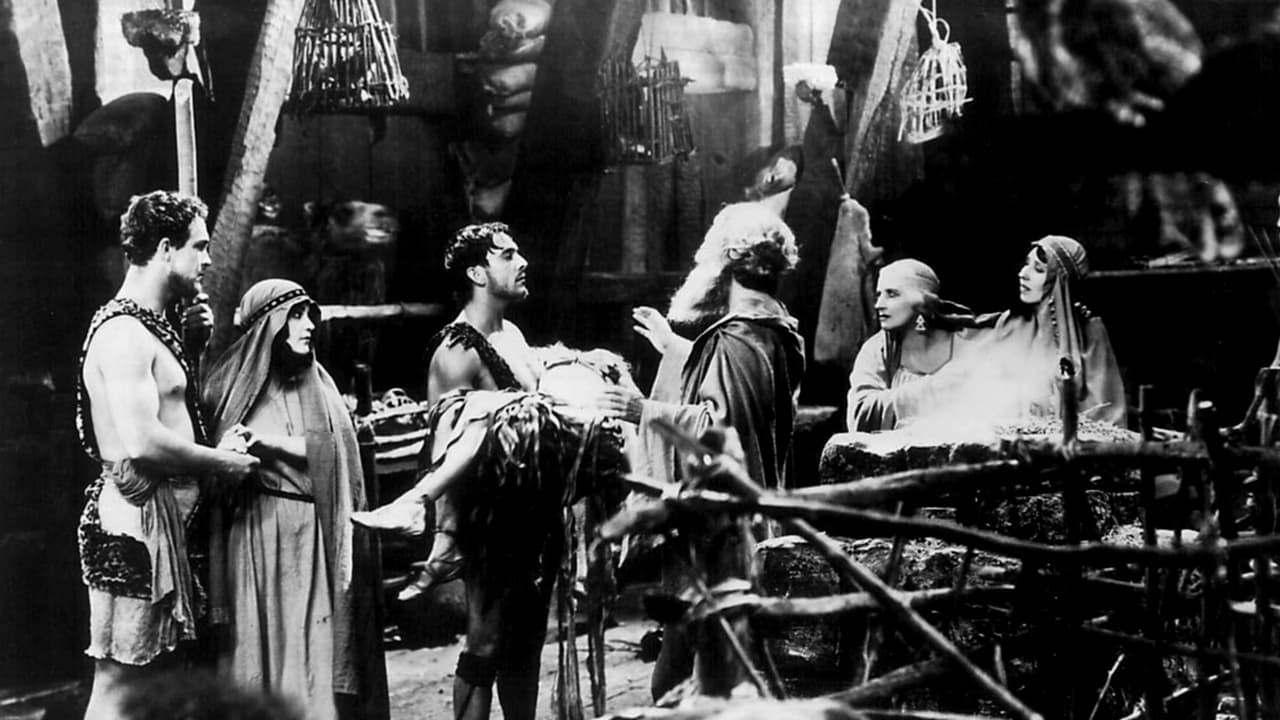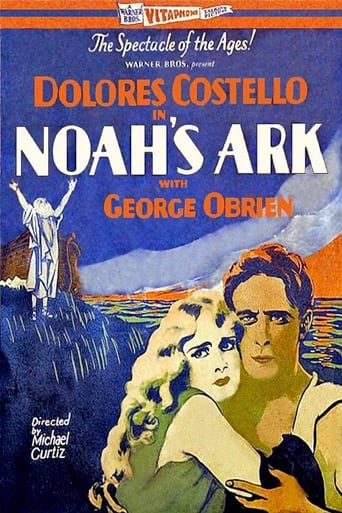

Better Late Then Never
... View MoreAm I Missing Something?
... View MoreA Brilliant Conflict
... View MoreThis is a coming of age storyline that you've seen in one form or another for decades. It takes a truly unique voice to make yet another one worth watching.
... View MoreNoah's Ark was the attempt of young hard driving head of production at Warner Brothers Darryl F. Zanuck to produce a biblical spectacle that would out DeMille, DeMille. Like DeMille he took a Victorian era modern story and juxtaposed it with the biblical story of Noah's Ark. And like DeMille leavened his story with a little sex.The leads are George O'Brien and Dolores Costello who play an American national and a German girl who make it to France as war is declared. They fall in love and are married, but her nationality is kept a secret lest she be detained and maybe executed as a spy. When the Yanks come Over There, O'Brien joins up, but Costello gets herself in a jackpot I won't go into except to say that it involves the lecherous Noah Beery. As they await their fate, they are comforted by a minister played by Paul McAllister who seems to pop up in the story in some odd places.At that point McAllister tells them the story of Noah's Ark and the characters in the modern story become characters in the Bible. O'Brien becomes Japheth one of Noah's sons and Costello becomes Miriam, a hand maiden in the house of Noah and O'Brien's girlfriend. Noah Beery becomes the evil Mesopotamian king who demands a virginal sacrifice and guess who he has in mind. And of course McAllister is Noah.The story gets quite a bit of embellishment spiritually as elements from different Bible stories get tossed into the plot. O'Brien like Samson is blinded and condemned to work a grist mill and Noah's sign from God to build the Ark is the burning bush. In addition God is called Jehovah and as we know God had no name until it was revealed to Moses many generations later. C.B. DeMille would have scolded Zanuck for being that bad on scholarship. But he would have applauded Zanuck for the use of scantily clad maidens to show Mesopotamia's decadence.Which the modern minister McAllister and the titled narrative compare to modern times in the tradition of DeMille.Myrna Loy has a role in both the modern and biblical story. If you look you might spot both John Wayne and Andy Devine as extras drowning in God's Flood. O'Brien and Costello make an earnest pair of young lovers who face the future with the hope that no more wars will happen after the Great War as World War One was then called. It should be remembered that the United States and France led many nations to sign the Kellogg-Briand pact around the same time, outlawing war. Just about every nation that signed it did go to war at some point thereafter, except maybe Switzerland. That would have resonated with 1928 audiences as well as the added sequences of dialog which Warner Brothers as the studio which introduced sound would be expected to include.Noah's Ark is a rather dated film, but the special effects were state of the art for its time. It's a curiosity for today's viewers.
... View MoreThis may be the strangest movie you will ever see that was not intended to be strange. It was directed by the fellow who a generation later would make "Casablanca." It was written as a sort of writing masterpiece by a nearly illiterate fellow who would later become a master of the studio system, a real power. Its strange in so many ways. It folds a collection of Old Testament stories centered on Noah's flood with a simple morality play set in and about WW I. Its a very, very strange superposition that doesn't in any way make sense. The sheer audacity of someone who thought it would is astonishing. Many people were killed in each, I suppose. Some central characters in both stories are played by the same actors, which makes the supposed similarity between the two threads gobsmackingly puzzling.Moreover, all the Bible parts are wrong, assuming "right" means that you care about what is actually written. Since virtually no one does this section of the Bible is hard to make sense of, being itself an unhappy mix of bits from diverse and sometimes contradictory sources.Its part silent, and part talkie.And its unhappily wrong in its expectations that the world war depicted would by virtue of God's grace be the last war. Its heart wrenching.A specific irony is that a sort of Jewish queen is played by a woman, who in the modern drama is German. The patriarchs are stereotypically Jewish looking, but the main characters are northern European. Cinematically, its grand. The modern sequences are clumsy, but the Bible sequences are pretty impressive, simply because of the scale.There really were thousands of extras. And they really did get deluged, in scenes that have them fighting for their lives. Some of the effects are goofy, but others are clearly done in reality: buildings collapsing on people.Toward the end of this, you feel that God, having gotten impatient with all the mucking around with grandly confused narrative, has decided to wipe out the whole movie.Ted's Evaluation -- 2 of 3: Has some interesting elements.
... View MoreOne year before Jean Harlow caught the eyes of two war-embittered soldiers in "Hell's Angels" (1930), this gigantic, vivacious, masterfully scored drama hit theaters. It was the most expensive film of the early sound era up to that time. Thanks to TCM and numerous film archives who pitched in for the restoration, we are now able to treasure it further for future generations to behold. Mike Curtiz was a tyranical perfectionist and put everything he had into this picture as he did with every such as "Casablanca" (1942), "The Adventures of Robin Hood" (1938), "Mystery of The Wax Museum" (1933), etc. There is alwayssomething big in his pictures, whether it cost $2 or $2,000,000 to produce, his imaginative genius and careful observation make his end results all the more astonishing. One of the even greater things about this picture is it's score. God bless Louis Silvers for writing it. Silvers also conducted the same Vitaphone orchestra that scored "The Jazz Singer" (1927) which also sported some pretty awesome tunes. The love theme is definitely one to behold. The cast is very nicely cast. George O'Brien makes a nice talkie transition with his suave and cunning voice that makes him sound 5 years younger. Noah Beery's voice was even better; deep, deceptive, conniving. Dolores Costello?She's alright, nothing eye-candyish about her but, she's alright. Altogether, this picture is one that I believe needs more frequent distribution because of how important it was in it's time as a form of entertainment, but now for a play in modern-day morality. A must for everyone!
... View MoreSo many people were injured in shooting the biblical sequences for this film that star Delores Costello always referred to it as "FLOOD, MUD AND BLOOD" This film was made in the transitional period between silent and sound film so talking sequences were added to keep the film contemporary.
... View More